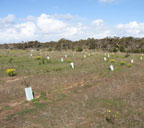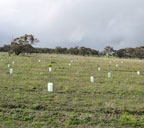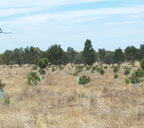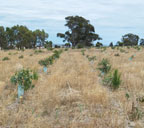Green and Global
Since 1992, the WOMADelaide Foundation has the privilege of hiring Botanic Park from the management of the Botanic Gardens of Adelaide. The Park is a magnificent 34-hectare arboretum of several hundred trees, some of which are over a century old, vast lawns and endangered flora.
Being held in an inner-city environment on land owned by the government means there are some limits to WOMADelaide’s ‘green capabilities’ however the festival takes pride in doing as much as possible to protect the Park and to hand it back to the Gardens in near-perfect condition (extreme weather conditions notwithstanding).
In 2013, WOMADelaide was proudly the Winner of the Partnerships Project in the Premier's Natural Resources Management Award for our relationship with Greening Australia (see further information below).
Waste Disposal
In 2001 WOMADelaide adopted a waste management strategy that has meant only biodegradable and recyclable wastes are produced by festival goers. All cups, plates, crockery, serviettes and any items sold in packaging at WOMADelaide are fully biodegradable, meaning that they will break down over time and be returned to the earth. In 2010 all biodegradable waste will be treated for composting.
In 2009 the festival collected over four tonnes of waste which was turned into compost. Over 50% of all waste produced by the festival was diverted from landfill. After previous festivals the compost produced has even been returned directly to and used by the Botanic Gardens.
Several onsite ‘waste compounds’ sort much of the waste before it is taken away.
Patrons are asked in printed materials and by stage MCs to carefully use the clearly marked bins on site.
In 2010, WOMADelaide will again use a three-bin system to collect:
- Biodegradable waste;
- Recycling; and
- General waste.
Greening Australia
Australia's largest environmental organisation, Greening Australia has joined forces with WOMADelaide to offset carbon emissions from this event through local biodiverse tree plantings.
Over the last six years, no other organisation in the country has planted more trees for environmental repair. Greening Australia provides expertly managed, large-scale tree planting, which has been proven to offset CO2 emissions, recover landscapes and nurture biodiversity.
Greening Australia with the support of Canopy, guarantees that every tree planted for carbon offset will remain in the ground for over 100 years. What's more, Greening Australia is fully compliant with the Kyoto Climate Control Treaty and the NSW Greenhouse Gas Abatement Scheme.
We have planted over 7000 native plants as a result of Womad carbon offsets, some species including:
- Golden Wattle (Acacia pycnantha)
- Wallowa (Acacia calamifolia)
- Sticky Hopbush (Dodonaea viscosa ssp. spatulata)


WOMADelaide seedlings August 2008


WOMADelaide seedlings Dec 2008
All species chosen are local provenance stock grown using locally sourced seed ensuring the genetic diversity of the site is maintained. Greening Australia provides ongoing management of the site to ensure the plants are maintained. This includes watering of the site and replacing any seedlings required, ensures the carbon offset is secure.
All plantings and revegetation will be use locally collected seed from remnant native mallee vegetation, thereby building biodiversity in the region. Planting will be undertaken in accordance with the Interim Australian Standards for Carbon Accounting for Greenhouse Sinks – Afforestation and Reforestation AS 4978.
Measurement systems include the carbon accounting tools of the Australian Greenhouse Office and the CRC for Greenhouse Accounting.
Greening Australia’s plantings for this project are Kyoto Protocol compliant and are registered on the land title, ensuring that the carbon offset will be permanently secure.
Location: Langhorne Creek
Size: approx. 50 hectares
Owner: Privately owned by local farmer
This site is located approximately 5 km from Langhorne Creek in the Coorong and Lower Lakes region of South Australia on the private property. The property has previously been utilised for farming practices.
Ferries-McDonald Conservation Park is approximately 5 km to the north-east while the Bremer River flows into Lake Alexandrina 14.5 km to the south. The site will act as a ‘stepping-stone’ between Ferries-McDonald Conservation Park and the Bremer River, providing a bush corridor for native fauna and flora species.
We are all responsible for contributing to the global warming problem, and you too can play a role in the solution ... offset some or all of the carbon dioxide produced by you or your organisation with plantings managed by Greening Australia.
To find out more about how you can reduce your ecological footprint visit www.greeningaustralia.org.au
Water & Toilets
The men’s urinals at WOMADelaide use water saving technology to ensure that no water is required for flushing.
Specially-designed cubes keep the urinals clean and hygienic without the need for water. This saves a great deal of water over the course of the four days of the festival.
All toilets use recycled toilet paper.
Bike Parking
WOMADelaide encourages patrons attending the event to ride a bike. The festival offers bike parks at each of the main entrances to accommodate more than 700 bikes.
Bus Service
A bus service is available from the city and North Adelaide which drops passengers off right in front of Botanic Park. The bus timetable will be available online in February.
Power
All of WOMADelaid's mains power is 100% accredited GreenPower through Origin Energy. Consequently, all mains power used at WOMADelaide will be purchased from an accredited renewable source and fed back into the national power grid.
